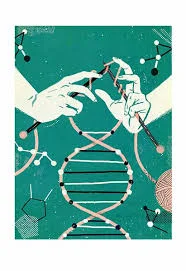Your Kids Are What You Eat - (and your Grandkids)
If I had a penny for every Daily Mail headline that screams ‘New Hope for Cancer Cure’ and then goes on to say that some scientist discovered a gene that causes cancer, I’d be a very rich man. Little ever comes of this - all scientists did was discover a gene that they found in someone with cancer. When I hear people say diabetes is hereditary I want to scream. Even if every British diabetic in 1900 and their descendants had been confined to breeding farms and forced to produce a baby a year their hereditary diabetic offspring would represent a miniscule fraction of the 2.5 million diabetics, and rising, in the UK. Diabetes, like heart disease and cancer, largely comes from environmental causes like overeating, underexercising, eating denatured food and being surrounded by a sea of manmade chemicals. There may be some genetic history that delays disease onset in some people, but genes are not the cause of diseases of affluence.Billions were spent mapping the human genome so that we could find cures for all our so-called hereditary diseases and in the end they found 25,000 genes, a humbling 5000 less than the 30,000 you’ll find in a mosquito. The genetic bonanza has failed to materialise but something useful did come of all that research - epigeneticsEpigenomes are the software that runs genes. Think of your genes as a computer, you never use the whole thing, but you activate different bits at different times. Epigenomes are the software that runs those bits - and you only use a few programmes at a time and then only a few bits of those programmes. They’ve just begun to count epigenomes and estimate they run into the millions. And they change all the time, depending on circumstances.
Jean-Baptiste Lamarck (1744-1829) argued that acquired characteristics could be inherited. But this Lamarckianism was replaced by Darwin’s theory of natural selection and the scientific world for 150 years accepted that genes were the be-all and end-all of our makeup. But epigenetics has brought Lamarck back to centre stage.
He argued that if a giraffe stretched its neck to reach leaves higher up the tree, its kids would inherit longer-necks. Harvard research studied rats in mazes that took 165 attempts to run it perfectly. After a few generations, their grandkids could get it right after 20 attempts. Just think, if you did the Times crossword every day for 10 years and then had babies your kids would inherit a heightened verbal ability (or maybe just talk in riddles and anagrams). If you overeat then your kids will be predisposed to obesity. If you smoke... don’t get me started.
If we eat a moderate diet of organic food, live in an unpolluted environment and in decent conditions and take plenty of exercise we have the potential to gift our children and grandchildren with unimaginable levels of health, happiness and longevity. Coué’s mantra: “Every day, in every way, I’m getting better and better” could apply to all of mankind and, indeed, the whole planet, plants, animals and microorganisms.
Instead of the disease-obsessed fatalism of traditional genetics, we can have free-will optimism. Instead of passively accepting that we are locked in a DNA-driven destiny we can improve our genes and create the future that we want.
The healthy living movement has always been driven by an intuitive acceptance of this. There is a responsibility here, too - we owe it to future generations to do right by them. We may have bankrupted their financial future, but we shouldn’t plunder their piggybank of health as well. Epigenetics has proved that we can be masters of our own fates.
What’s stopping us?











